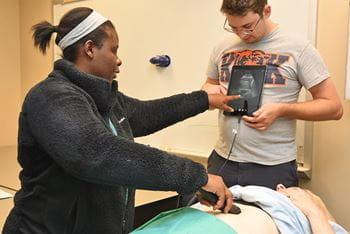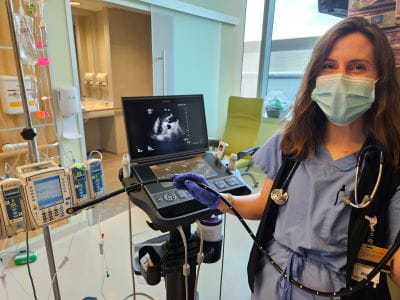IU School of Medicine has the most extensive point-of-care ultrasound (POCUS) program in the country. The school developed a POCUS ecosystem where students, residents, fellows, faculty and staff statewide work together to teach and learn from each other. This work began in 2018 and was super-charged with the purchase of 700 devices to support an expansion of POCUS in the school’s clinical education.
POCUS in Undergraduate Medical Education
IU School of Medicine students gain skills and competency progressively throughout their four years of training:
- Phase 1 (Years 1 and 2): The goal of Phase 1 is for students to gain baseline competency in understanding and using POCUS. Students learn about POCUS and how to use the technology to perform scans. Early on, students learn how to identify anatomy on a POCUS image and consider how POCUS exams fit within a clinical context. They have many opportunities to practice in class, simulations, and POCUS labs.
- Phase 2 (Year 3): POCUS curriculum extends throughout required clerkships, where students independently perform POCUS exams in 5 clerkships and generate a basic POCUS report of their findings. This increases their knowledge and skills in clinical settings.
- Phase 3 (Year 4): In their final year, students build competency by performing, reporting and synthesizing findings from POCUS exams to form a diagnosis. This occurs in the Emergency Medicine clerkship, electives, and in SonoKombat, a gaming tournament of various POCUS skills and knowledge.
Undergraduate POCUS Curriculum |
||||||
|---|---|---|---|---|---|---|
| Transition 1 | Year 1 | Year 2 | Transition 2 | Year 3 | Year 4 | |
| Physics and Instrumentation | Orientation | Didactics | Didactics |
SonoKombat | ||
| Aorta | Didactics |
Didactics |
Family Medicine | SonoKombat | ||
| Cardiac | Didactics Lab — two views |
Didactics Lab — four views |
Anesthesia |
Emergency Medicine SonoKombat |
||
| Deep Vein Thrombosis | SonoKombat | |||||
| Focused Assessment with Sonography for Trauma (FAST) | Didactics Lab |
Didactics Lab |
Surgery | Emergency Medicine SonoKombat |
||
| Heptobiliary | Didactics | SonoKombat | ||||
| Lung | Didactics Lab |
Didactics Lab |
Internal Medicine | Emergency Medicine SonoKombat |
||
| Pregnancy | OB/GYN | SonoKombat | ||||
| Procedural Guidance | USGPIV training |
Anesthesia | SonoKombat | |||
| Renal | Didactics | Didactics | Internal Medicine | SonoKombat | ||
| Soft Tissue | Lab | SonoKombat | ||||
| Skills Assessment/OSCE | Skills Assessment: Cardiac two views, Lung, FAST |
Skills Assessment: Cardiac four views, Lung, FAST |
OSCE/CPX exam | |||
POCUS Probe Society and Golden Probe Honor Society
IU School of Medicine’s POCUS Probe Society and POCUS Golden Probe Honor Society encourage self-directed POCUS education and training beyond the classroom. The groups are sponsored by the POCUS program and provide recognition of IU School of Medicine medical students who go “above and beyond” what is required in the curriculum and aspire to be POCUS leaders. They also include opportunities to train and mentor emerging POCUS leaders within IU School of Medicine. The societies are only open to IU School of Medicine medical students at this time; they will be opened to residents, fellows and faculty in the future.
POCUS Probe Society
The POCUS Probe Society is an introductory club-like group where membership criteria are easily within reach and enrollment is ongoing. Requirements are easily obtainable, but require additional work alongside the curriculum.
POCUS Probe Society applicants must be IU School of Medicine students. They have two paths:
- Complete the IU School of Medicine POCUS summer program. Students who complete this program are automatically enrolled in the society and do not need to apply.
OR - Meet the membership criteria listed below. Once they have completed the criteria, applicants must complete a short application to attest they have met all the requirements. The POCUS program manager will verify that applicants have met criteria and inform them of their successful acceptance into the society.
Learn more and access requirements through the POCUS Canvas site.
POCUS Golden Probe Honor Society
The POCUS Golden Probe Honor Society is a more prestigious honor society whose purpose is to develop future POCUS leaders. It has more rigorous requirements and greater responsibilities for membership. Membership is awarded if criteria are met in four key domains. Applications are accepted until March 31 annually with membership awarded by May 1.
POCUS Golden Probe Honor Society applicants must be IU School of Medicine medical students and complete an application that will be verified by the POCUS program manager and reviewed by POCUS leadership. Residents, fellows and faculty at IU School of Medicine will be eligible in the future.
Learn more and access requirements through the POCUS Canvas site.
Membership Criteria |
||
|---|---|---|
| POCUS Probe | POCUS Golden Probe | |
| POCUS Education |
Complete the following:
|
Complete the following:
|
| POCUS Practice | Perform 35 total exams (Personal log or Butterfly Cloud) |
|
| POCUS Training | Become certified to be a POCUS student instructor by teaching a fellow student how to perform a POCUS exam and receiving a passing grade on the POCUS student teaching evaluation form. | Become certified to be a POCUS student instructor and then serve as an active student instructor. Students must have taught at a minimum of eight events or 20 hours of instruction time. |
| POCUS Scholarship | Put together a POCUS Problem-Based Learning and Improvement presentation and submit to the IU School of Medicine POCUS Program | Participate in at least one POCUS scholarship project and/or submit an abstract involving POCUS research to IU School of Medicine Education Day |
Summer Training Program
Since its inception in 2021, more than 100 rising second year medical students have developed their POCUS skills during the school’s summer training program. The two-week program allows students to become comfortable with POCUS and later serve as peer educators for students and faculty at training events. The students also become POCUS champions as the school continues to expand the use of POCUS in the educational program.
Under the guidance of faculty and senior sonography students, students learn how to use POCUS in a variety of clinical specialties and spend 16-24 hours practicing on standardized patients or simulators. They also receive POCUS devices that offer time to practice outside of the classroom. The program has been funded through the school’s United States Health Resources Administration PRIME grant and IU Health Values grants.
Video
Sonokombat
Learning and practicing point of care ultrasound can be fun, especially during Sonokombat. Modeled after the Society of Academic Emergency Medicine’s SonoGames, IU’s Sonokombat is a series of games students play to practice their POCUS skills.
POCUS in Graduate Medical Education
IU School of Medicine is one of only three schools with shared POCUS curriculum in its residency programs. Ten programs offer training for residents and fellows, including emergency medicine, internal medicine, family medicine, medicine-pediatrics, general surgery, obstetrics and gynecology, nephrology and critical care.
Training modules developed by IU School of Medicine POCUS experts are also available to every residency program. Each module includes a pre- and post-module knowledge assessment. Residency programs select pertinent modules to customize their training to meet their specialty’s needs.
Equipment and Resources

IU School of Medicine has a robust POCUS training program on all nine campuses. Nearly 1,050 POCUS devices and tablets, including mini tablets, are distributed statewide. Because POCUS is so portable, training can take place just about anywhere.
-
State of the art simulation phantoms that approximate real patients allow learners to experience a wide variety of pathological conditions.
-
In-person learning opportunities occur in hands-on scanning labs and simulation centers at all nine campuses, and are facilitated by POCUS expert physicians, sonographers, residents and students.
-
Sonographers are available to go to clinical settings, classrooms or conference rooms to provide education to busy faculty.
POCUS ECHO
Project ECHO (Extension for Community Healthcare Outcomes) connects local primary care teams with inter-disciplinary specialists to spread knowledge and amplify local capacity to provide best practice care for complex chronic health conditions. It is primarily focused on rural and traditionally underserved populations. This low-cost, high-impact intervention is achieved by leveraging technology to connect expert mentors and multiple local primary care providers in online video-conferencing teleECHO clinics.
During POCUS ECHO, a panel of experts who constitute the ECHO “hub team” facilitate brief didactics and de-identified patient cases presented by participants. Students and established providers receive support and recommendations from their peers while learning how to comprehensively apply POCUS skills.
The program is free and open to all providers, including physicians, physician assistants, advanced practice nurses, nurses, social workers, case managers, sonographers and patient navigators.
POCUS ECHO meets on the second and fourth Monday of each month from 12:00-1:00 p.m. ET via Zoom.
